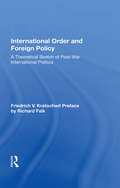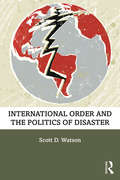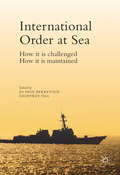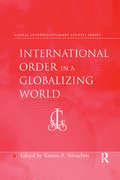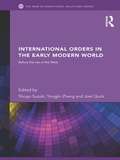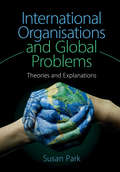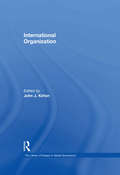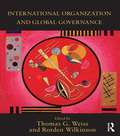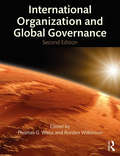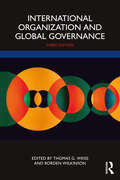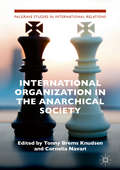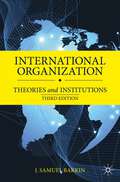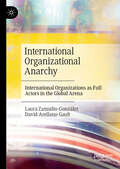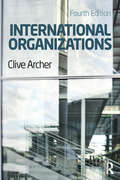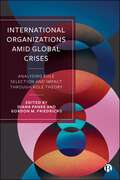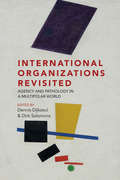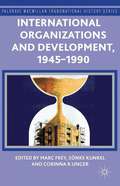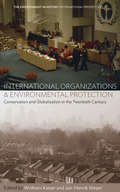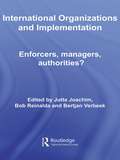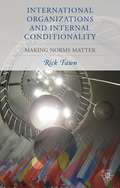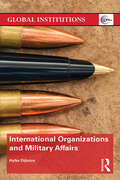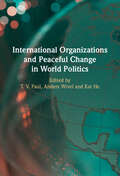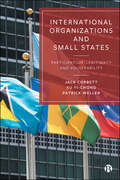- Table View
- List View
International Order And Foreign Policy: A Theoretical Sketch Of Post-war International Politics
by Friedrich V. KratochwilThe author develops a new perspective for the study of problems of international order by drawing on and integrating insights from game theory, social psychology, hermeneutics, and language philosophy. His case study is the rise and demise of the Cold War. This newly developed approach not only allows a critical evaluation of the contending argumen
International Order and the Politics of Disaster
by Scott D. WatsonIn this indispensable and comprehensive text, Scott D. Watson critically examines the current understanding of international order that underpins international disaster management and disaster diplomacy. Based on empirical analysis of the three international disaster management regimes - disaster relief, disaster risk reduction, and disaster migration - and case studies of disaster diplomacy in the United States, Egypt and China, Watson argues that international disaster management and disaster diplomacy are not simply efforts to reduce the impact of disasters or to manage bilateral relations but to reinforce key beliefs about the larger international order. Challenging the conventional understandings of disasters as natural, as exogenous shocks, or as unintended and accidental outcomes of the current order, this text shows how the ideological foundations of the current heterogenous international order produce recurrent disasters. International Order and the Politics of Disaster is a vital source for undergraduate or graduate students interested in international responses to disasters and complex humanitarian emergencies, forced migration and displacement, as well as climate change and development.
International Order at Sea
by Geoffrey Till Jo Inge BekkevoldThis book examines how international order at sea is challenged, changed and maintained. The book surveys challenges to the international order at sea in the Asia-Pacific, the Indian Ocean Region, the Atlantic Ocean and the Arctic Ocean. It explores the interaction between and cooperation among leading, emerging and smaller naval powers, both naval and coastguard responses, required for the maintenance of good order at sea. Six broad and interlinked issues are identified that will influence the future international order at sea: the balance between the maritime and the continental domains; the balance between great power rivalry and cooperation; the contest between access and denial; the operational balance between preparing; building and training for warfighting as opposed to operations other than war; how to manage 'disorder' security challenges that very often transcends territorial waters and national boundaries, and finally, the balance between safeguarding national interests and contributing to collective efforts preserving the international order at sea.
International Order in a Globalizing World (Global Interdisciplinary Studies Series)
by Yannis A. StivachtisThere is a growing recognition that globalization is leading to fundamental changes in world order, creating new imperatives and requiring new ways of understanding the international system. Two of the most important actors in the contemporary international system are the United States and Europe, and their relationship is fundamental in shaping international order. International order shapes, and is also being shaped by, the forces of globalization, whether cultural, political or economic. This volume examines issues that transcend national and cultural boundaries, discussing international order from the perspective of the English School of International Relations. It covers areas such as: great powers' foreign policy; relations among great powers; sovereignty, democracy and legitimacy; international terrorism and intelligence; and institutions and international organizations. Ultimately, it analyzes what is to be done to assure a stable international order. The volume is relevant to security studies, foreign policy, transatlantic relations and international organizations, as well as international relations theory.
International Orders in the Early Modern World: Before the Rise of the West (New International Relations)
by Joel Quirk Yongjin Zhang Shogo SuzukiThis book examines the historical interactions of the West and non-Western world, and investigates whether or not the exclusive adoption of Western-oriented ‘international norms’ is the prerequisite for the construction of international order. This book sets out to challenge the Eurocentric foundations of modern International Relations scholarship by examining international relations in the early modern era, when European primacy had yet to develop in many parts of the globe. Through a series of regional case studies on East Asia, the Middle East, Africa and Latin America, and Russia written by leading specialists of their field, this book explores patterns of cross-cultural exchange and civilizational encounters, placing particular emphasis upon historical contexts. The chapters of this book document and analyse a series of regional international orders that were primarily defined by local interests, agendas and institutions, with European interlopers often playing a secondary role. These perspectives emphasize the central role of non-European agency in shaping global history, and stand in stark contrast to conventional narratives revolving around the ‘Rise of the West’, which tend to be based upon a stylized contrast between a dynamic ‘West’ and a passive and static ‘East’. Focusing on a crucial period of global history that has been neglected in the field of International Relations, International Orders in the Early Modern World will be interest to students and scholars of international relations, international relations theory, international history, early modern history and sociology.
International Organisations and Global Problems: Theories and Explanations
by Susan ParkInternational organisations (IOs) are considered fundamental in addressing global problems, but how effective are they? Conflict (war), human rights, global health, financial governance, international trade, regionalisation, development and the environment are all issues that international organisations have been created to address. This book looks at these eight key issue areas and guides the reader through an analysis of the successes and failures of international organisations in solving issues in global politics. With an introduction to international relations theory, it incorporates the best and most up-to-date scholarly research, and applies it to examples from around the world to show how to answer the question, 'Are IOs a help or a hindrance?' This textbook is an essential resource for courses on global governance, international organisations and international relations. Including an expanded further reading list for each global issue, as well as a thorough bibliography of the most up-to-date research, this is a resource that will be useful during study and on into the future.
International Organization
by J. Samuel BarkinThe newly revised and updated edition of International Organization is an introduction to the study of international organizations in the field of International Relations intended for students in the discipline. It looks at the different ways in which IOs are studied and then applies these different modes to a variety of specific case studies.
International Organization (The Library of Essays in Global Governance)
by John J. KirtonFor well over a century, international organizations have been central to the study and practice of international relations and global governance. But how much and how do they help, hinder or otherwise alter the behaviour of the actors who utilize them and provide public goals for the global community as a whole? By assembling the leading works that have defined the scholarly field of international organization from realist, liberal institutionalists, constructivists and political economy traditions, this work examines the many organizations which have formed, in ever-expanding numbers and fields, over the years, the degree to which they have succeeded and their future potential. It looks at the changing international arena, particularly with the expansion of civil society and how that affects the role of such organizations. Has a formula for an effective and successful international organization developed or will one have to wait for the next generation of organizations, institutions and regimes?
International Organization and Global Governance
by Thomas G. Weiss Rorden WilkinsonFeaturing a diverse and impressive array of authors, this volume is the most comprehensive textbook available for all interested in international organization and global governance. Organized around a concern with how the world is and could be governed, the book offers: in-depth and accessible coverage of the history and theories of international organization and global governance; discussions of the full range of state, intergovernmental, and nonstate actors; and examinations of key issues in all aspects of contemporary global governance. The book's 50 chapters are arranged into 7 parts and woven together by a comprehensive introduction to the field, separate section introductions designed to guide students and faculty, and helpful pointers to further reading. International Organization and Global Governance is a self-contained resource enabling readers to better comprehend the role of myriad actors in the governance of global life as well as to assemble the many pieces of the contemporary global governance puzzle.
International Organization and Global Governance
by Thomas G. Weiss Rorden WilkinsonCompletely revised and updated for the second edition, this textbook continues to offer the most comprehensive resource available for all interested in international organization and global governance. The book offers: In-depth and accessible coverage of the history and theories of international organization and global governance. Discussions of the full range of state, intergovernmental, and non-state actors. Examinations of key issues in all aspects of contemporary world politics. New additions to this edition include: New and revised chapters on theories of international organization and global governance. New substantive chapters on global corporations, China, financial markets, terrorist organizations, governing global energy, and the Internet. Updated contributions to reflect the changing nature of world politics. The book comprises fifty-four chapters arranged in seven parts and woven together by a comprehensive introduction to the field, along with separate introductions to each part to guide students and faculty, and helpful pointers to further reading. International Organization and Global Governance is a self-contained resource enabling readers to comprehend more fully the role of myriad actors in the governance of global life as well as to assemble the many pieces of the contemporary global governance puzzle.
International Organization and Global Governance
by Thomas G. WeissCompletely revised and updated, this textbook continues to offer the most comprehensive resource available. Concise chapters from a diverse mix of established and emerging global scholars offer accessible, in-depth coverage of the history and theories of international organization and global governance and discussions of the full range of state, intergovernmental, and non-state actors. All chapters have been revised and rewritten to reflect the rapid development of world events, with new chapters added on: Chinese approaches to international organization and global governance The UN System The Global South Sustaining the Peace Queering International Organization and Global Governance Post-colonial Global Governance The Sustainable Development Goals The English School Inequality Migration Divided into seven parts woven together by a comprehensive introduction, along with separate introductions to each part and helpful pointers to further reading, International Organization and Global Governance provides a balanced, critical perspective that enables readers to comprehend more fully the role of myriad actors in the governance of global life.
International Organization in the Anarchical Society: The Institutional Structure of World Order (Palgrave Studies in International Relations)
by Cornelia Navari Tonny Brems KnudsenThis book takes up one of the key theoretical challenges in the English School’s conceptual framework, namely the nature of the institutions of international society. It theorizes their nature through an analysis of the relationship of primary and secondary levels of institutional formation, so far largely ignored in English School theorizing, and provides case studies to illuminate the theory. Hitherto, the School has largely failed to study secondary institutions such as international organizations and regimes as autonomous objects of analysis, seeing them as mere materializations of primary institutions. Building on legal and constructivist arguments about the constitutive character of institutions, it demonstrates how primary institutions frame secondary organizations and regimes, but also how secondary institutions construct agencies with capacities that impinge upon and can change primary institutions. Based on legal and constructivist ideas, it develops a theoretical model that sees primary and secondary institutions as shared understandings enmeshed in observable historical processes of constitution, reproduction and regulation.
International Organization: Theories and Institutions
by J. Samuel BarkinThis comprehensively revised and updated edition offers an introduction to international organizations (IO) theory in the field of IR. It looks at the different ways in which IOs are studied and then applies these different modes to a variety of specific case studies.The book is written as a primer for students studying global governance and IR theory. It highlights analytic tools available to understand what IOs are designed to do, how they work, what effects they have, and how to design them better. It goes beyond simple questions of whether IOs matter, and looks at the ways in which the different analytical tools developed within the rubric of IO theory are useful for answering different questions about the role of IOs in international politics.
International Organizational Anarchy: International Organizations as Full Actors in the Global Arena
by David Arellano-Gault Laura Zamudio-GonzálezInternational organizations are central actors on the global stage, yet their very existence is deeply shaped by their organizational nature. As entities with histories and environments, they navigate complex networks of members and stakeholders—often pursuing conflicting objectives. These organizations must operate, decide, and act amidst unforeseen events and challenges. Far from being abstract entities, international organizations embody all the complexities of organizations in the fullest sense. To survive, they must contend with anarchy: not only within the international system but also within their own structures and decision-making processes. Bridging the gap between Organization Theory and International Relations offers a promising avenue for building the concepts and case studies necessary to understand how organizational anarchy contributes to the creation of international order.
International Organizations
by Clive ArcherWhat is the role of international organizations in the international political system? The fourth edition of Clive Archer’s widely used textbook continues to provide students with an introduction to international organizations, exploring their rise and development, and accounts for their significance in the modern international political system. International Organizations fourth edition: has been fully updated to take into account the considerable developments in the field since the last edition was published in 2001. continues to offer a unique concise yet comprehensive approach, offering students an accessible and manageable introduction to this core part of international relations. offers an authoritative guide to the literature about international organizations and provides advice on further reading.
International Organizations
by Ian HurdThe first textbook to offer detailed coverage of the politics, law, and practice of the world's most important international organizations (IOs). Each chapter examines the legal obligations that give IOs power in international politics; how IOs try to ensure compliance from their members; and how IOs seek the enforcement of their rules. Key international organizations covered in detail include: The World Trade Organization The International Monetary Fund The World Bank The United Nations The International Labor Organization The International Court of Justice The International Criminal Court The European Union The Association of Southeast Asian Nations The African Union Case studies show how each international organization operates in practice and the interaction between it and its members. End-of-chapter questions guide student discussion. This text thus gives students a comprehensive understanding of what IOs do, how and why they do it, and the problems they face. Book jacket.
International Organizations Amid Global Crises: Analysing Role Selection and Impact through Role Theory
by Jeremy Youde Stefan Rother Alexander Libman Amy Below Sebastian Harnisch Rikard Bengtsson John F. Clark Laura Von Allwörden Maria J. Debre Leslie E. WehnerInternational Organizations (IOs) have been at the forefront of responding to crises in the 21st century, and yet there is little comparative research on how, and how effectively, they have done this. This book fills this gap by exploring what roles IOs take in response to global crises and to what effect. Bringing together a range of international contributors, the book examines a vast array of international and regional organizations, including the International Organization for Migration, World Health Organization, African Union and European Union. Aiming to answer key questions about IO behaviour, the book investigates these IOs’ responses to pressing issues including the global COVID-19 pandemic, the liberal order and security, and the climate crisis.
International Organizations Revisited: Agency and Pathology in a Multipolar World
by Dennis Dijkzeul and Dirk SalomonsDespite the sustained scholarly attention that the United Nations and international NGOs have received in the twenty-first century, they still remain under-researched from a management studies perspective. This volume brings together rich analyses of these organizations’ functioning, arguing that they are best understood as intermediaries between international decision-making and funding bodies in the developed world and initiatives that take place on the ground, primarily in the Global South. Based on current management research, this follow-up to Rethinking International Organizations (Berghahn, 2002) provides a wealth of both empirical and theoretical insights, along with practical recommendations how these organizations can function more effectively.
International Organizations and Development, 1945–1990
by Marc Frey Sönke Kunkel Corinna R. UngerThis volume explores how international organizations became involved in the making of global development policy. The book looks at the driving forces and dynamics behind that process, and critically assesses the consequences their policies have had around the world. It addresses problems that are at the core of today's debate about international organizations: how and why did international organizations and INGOs make development their mission in the first place? What did they promise and what were they expected to achieve? How did they conceptualize development and through what means did they promote it? What changes did they bring about in the field of global development? And thus, what difference did they make?
International Organizations and Environmental Protection: Conservation and Globalization in the Twentieth Century (Environment in History: International Perspectives #11)
by Wolfram Kaiser Jan-Henrik MeyerPollution, resource depletion, habitat management, and climate change are all issues that necessarily transcend national boundaries. Accordingly, they and other environmental concerns have been a particular focus for international organizations from before the First World War to the present day. This volume is the first to comprehensively explore the environmental activities of professional communities, NGOs, regional bodies, the United Nations, and other international organizations during the twentieth century. It follows their efforts to shape debates about environmental degradation, develop binding intergovernmental commitments, and-following the seminal 1972 Conference on the Human Environment-implement and enforce actual international policies.
International Organizations and Implementation: Enforcers, Managers, Authorities? (Routledge/ECPR Studies in European Political Science)
by Jutta Joachim Bob Reinalda Bertjan VerbeekInternational organizations have once more become subjects of investigation for a whole range of scholars: political scientists, international relations specialists, organization theorists, and policy experts alike. The end of the Cold War, increased globalization, and the intensification of regional and functional cooperation all have produced a greater interest in the role of international organizations, and rightly so, since they increasingly take part in global governance as over-burdened governments become more and more willing to transfer responsibility to them or need to work through them. International Organizations and Policy Implementation determines the extent to which international intergovernmental organizations are involved in the national implementation of internationally formulated policies. In particular, it specifies the conditions under which they can be more or less successful in influencing the course and content of implementation or imprint their perspective on domestic policies. This edited volume helps to fill a gap in the existing literature in two respects: contrary to many implementation studies, the chapters are comparative in nature contrasting the role of international organizations across time, different levels, or different issue areas; and, second, they are theoretically grounded.
International Organizations and Internal Conditionality
by Rick FawnIn retrospect, NATO and EU enlargements can be viewed as easy; they admitted states that wanted to be involved and were lavishly rewarded. In contrast, this study explores the harder politics waged by the much larger regional organizations, the Council of Europe and the Organization for Security and Co-operation in Europe (OSCE). These organizations lack material incentives or instruments of coercion, instead having to work on the basis of shared values. They also face a variety of threats from recalcitrant members. In this book, Fawn uniquely uses internal conditionality to explain how these organizations have cleverly and subtly responded to such difficulties. Drawing on interviews in a range of post-communist countries and with practitioners inside and outside the organizations, the diverse case studies in this book examine issues of conflict, democratization, the death penalty, rewarding high office and retaining institutional membership. Fawn explores how international organizations which lack powers of compulsion can respond to threatening member-states and offers practical lessons for the international promotion of norms. This book will appeal to those interested in how international underdogs work and win in tough circumstances, as well as scholars of International Relations, Central and Eastern European Studies, Post-Soviet Studies and European Security.
International Organizations and Military Affairs (Global Institutions)
by Hylke DijkstraFrom the UN Department of Peacekeeping Operations to the NATO International Staff and the European External Action Service, international bureaucrats make decisions that affect life and death. In carrying out their functions, these officials not only facilitate the work of the member states, but also pursue their own distinct agendas. This book analyzes how states seek to control secretariats when it comes to military operations by international organizations. It introduces an innovative theoretical framework that identifies different types of control mechanisms. The book presents six empirical chapters on the UN, NATO, and EU secretariats. It provides new data from a unique dataset and in-depth interviews. It shows that member states employ a wide range of control mechanisms to reduce the potential loss of influence. They frequently forfeit the gains of delegation to avoid becoming dependent on the work of secretariats. Yet while states invest heavily in control, this book also argues that they cannot benefit from the services of secretariats and keep full control over outcomes in international organizations. In their delegation and control decisions, states face trade-offs and have to weigh different cost categories: the costs of policy, administrative capacity, and agency loss. This book will be of interest to scholars, postgraduates, and officials in international organizations and national governments, dealing with questions of international political economy, security studies, and military affairs.
International Organizations and Peaceful Change in World Politics
by T. V. Paul Kai He Anders WivelInternational organizations play an important, if imperfect, role in world politics, solving collective action problems in security, economic, environmental, and global health among others. While many believe that international organisations have formed critical pillars of global governance, sceptics contend that they reflect the power politics of the day and the interests of hegemonic powers. This volume examines whether international organizations contribute to or detract from peaceful change, acting as agents of both status quo and stasis. Providing a historical overview of international organizations, from the nineteenth century to the current day, a team of leading scholars offer an overview of how major theoretical approaches – Liberalism, Constructivism, Rationalism and Realism – have contributed to our understanding of the role played by international organizations in peaceful change. In particular, the roles of the United Nations General Assembly, UN Peacekeeping, UN Environment Program, World Health Organization, World Trade Organization and G20 are analysed.
International Organizations and Small States: Participation, Legitimacy and Vulnerability
by Xu Yi-Chong Jack CorbettInternational Organizations (IOs) are vital institutions in world politics in which cross-border issues can be discussed and global problems managed. This path-breaking book shows the efforts that small states have made to participate more fully in IO activities. It draws attention to the challenges created by widened participation in IOs and develops an original model of the dilemmas that both IOs and small states face as the norms of sovereign equality and the right to develop coincide. Drawing on extensive qualitative data, including more than 80 interviews conducted for this book, the authors find that the strategies which both IOs and small states adopt to balance their respective dilemmas can explain both continuity and change in their interactions with institutions ranging from UN agencies to the World Trade Organization.
